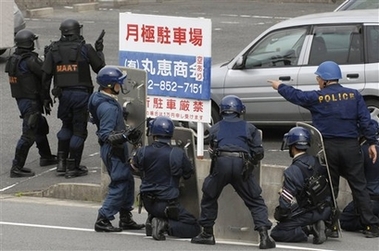Asia-Pacific
Outbreak of violent crime unnerves Japan
(AP)
Updated: 2007-05-19 10:05
 |
Large Medium Small |
 Japanese police officers take up their position by a parking lot near a house where an armed man went berserk at Nagakute, central Japan, on Friday May 18, 2007. Police rescued a hostage Friday 24 hours after she was taken captive by her ex-husband in a shooting spree that killed one policeman and left three other people wounded but the standoff still continued. [AP] |
TOKYO - A mother beheaded by her son. A baby who suffocated after being stuffed by his parents in the baggage compartment of a motorbike while they went gambling. A murderous shooting spree during a hostage standoff.
An outbreak of violent crime this week has triggered soul-searching and outrage in Japan, a country that has long prided itself on its safe streets and tight communal bonds.
The "appalling destruction" of traditional values — as one lawmaker put it — climaxed Friday, when a former gangster killed a policeman and wounded his son and daughter during a shooting rampage at his home, where he had held his ex-wife hostage for 24 hours. It was the first time an on-duty policeman was shot to death since 2001.
The standoff capped a week of mayhem and mistreatment.
On Tuesday, a teenager strolled into a police station with his mother's severed head in a bag. On Thursday, a couple was arrested after their 1-year-old son's body was found wrapped in a plastic bag and dumped in a gutter. The baby died after his parents allegedly left him in the baggage hold of a motorbike while they gambled at a pachinko pinball parlor.
The same day, a 3-year-old child was abandoned by his father at an anonymous drop box meant for unwanted infants.
"We are witnessing the deterioration of Japanese society," ruling party politician Tsuneo Suzuki told parliament Thursday. "We must stem this appalling destruction of family and community morals."
While Japan is still a relatively safe country by international standards, crime is on the rise as the country grapples with a widening gap between rich and poor and other social ills.
A tide of corporate layoffs amid widespread restructuring, the fragmentation of extended families and a creeping sense of urban alienation all contribute to the erosion of mores, experts say.
Japan, a country of 127 million people, had just 1,391 homicides in 2005, compared with 16,692 in the United States. But overall crime jumped to 2.27 million cases that year, from 1.81 million in 1996, and violent offenses nearly doubled to 73,772 cases, according to the National Police Agency.
"Anxiety is mounting in Japan about the increase of high-profile crimes. Due to rapid globalization, the traditional rules and social order are changing dramatically," said Jun Ayukawa, an expert on criminal psychology at Japan's Kwansei Gakuin University.
"While families used to act as brakes, there is an increase in crimes where people feel lost in despair and no longer care what happens to their families," he said.
Indeed, fractured families have figured prominently in this week's grisly headlines.
Motoki Tamiya and his wife, Mika, both 21, were arrested Thursday after DNA tests of the dead 1-year-old linked the boy to his mother. The baby's body was found last month on a remote road in the mountains of western Japan.
On Tuesday, Japan's only anonymous drop box for unwanted infants triggered a wave of anger after it was discovered that a 3-year-old preschooler — and not a newborn — was left by his father on the service's first day.
The drop-off, known as "Stork's Cradle," was begun by a Roman Catholic-run hospital in southern Japan to stem a wave of abandonments of newborns in unsafe public places.
The same day, there were more shocking headlines. A teenage boy carrying a severed head walked into a Japanese police station saying he killed his mother — the latest in a series of dismemberments.
News reports said the 17-year-old suspect hacked off his mother's head as she slept, then went to an Internet cafe to watch music videos — with the head — before turning himself into police in the morning.
In January, Tokyo was on edge after a woman confessed to cutting up her husband with a saw and dumping the body parts around the capital.
The recent surge in high-profile violent crime has spurred debate over tougher gun control rules, calls for strengthening the moral fiber of younger generations at the nation's schools as well as recriminations about the state of modern parenting.
Calls for more stringent gun control intensified last month when the Nagasaki mayor was shot and killed by an organized crime boss. Days later, police stormed an apartment and seized another gangster who allegedly gunned down a rival outside a Tokyo convenience store and had barricaded himself inside.
The use of guns is still relatively alien to the Japanese public. Handguns are strictly banned, and only police officers and other professionals, such as shooting instructors, are permitted to own them.
Friday's standoff ended when the gunman, Hisato Obayashi, 50, surrendered to police 24 hours after taking his ex-wife captive. The woman, identified as Michiko Mori, escaped from a bathroom window during the siege.
The violence erupted Thursday outside the central city of Nagoya when the suspect shot his adult son and daughter and killed a policeman trying to rescue a wounded comrade. News reports said Obayashi was a former mobster affiliated with Japan's largest crime syndicate, the Yamaguchi-gumi.
| 分享按钮 |